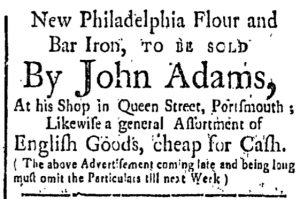What was advertised in a colonial American newspaper 250 years ago today?

“The above Advertisement coming late and being long must omit the Particulars till next Week.”
John Adams placed an advertisement in the December 18, 1767, edition of the New-Hampshire Gazette to inform readers that he sold “Philadelphia Flour and Bar Iron” and “a general Assortment of English Goods” at his shop on Queen Street in Portsmouth. An editorial note accompanied Adams’s notice: “The above Advertisement coming late and being long must omit the Particulars till next Week.” The shopkeeper’s much lengthier advertisement did appear in the next issue, but until then readers had to imagine what it might contain. Although they would not have been able to name all the “Particulars,” colonial consumers were so steeped in the print culture of marketing via newspaper advertisements that most would have accurately predicted that the complete notice included a lengthy list of merchandise that presented a multitude of choices. Adams did not benefit from sharing that list with potential customers in the December 18 issue, but when it did appear it concluded with a general description of “a variety of other Articles.” Even when allocated space for the entire advertisement, Adams chose to publish a partial list of his inventory and prompted consumers to imagine what other treasures they might discover if they visited his shop. The editorial note explaining that the advertisement had been abbreviated achieved the same purpose.
That note had at least three audiences. The first consisted of residents of Portsmouth who could easily visit Adams’s shop as part of their usual routines at some point in the coming week. The entire advertisement notified them that Adams carried an array of goods – so many that they could not all be listed in the current edition – that he sold “cheap for Cash.” Readers of the New-Hampshire Gazette who resided in Portsmouth’s hinterland comprised the second audience. They might visit town only occasionally, limiting their access to any of the shops there. The editorial note alerted them that Adams would soon publish more “Particulars” about his inventory, information that they could eventually take into account when planning their excursions into Portsmouth or sending their orders to the shopkeeper. Adams himself was the third audience for the editorial note. It may not have been apparent at the time he submitted his advertisement that it would not appear in its entirety. Even if Adams had been aware in advance, the note provided an acknowledgment and assurances that the printers would allocate sufficient space for his advertisement the following week. It simultaneously informed readers that the shopkeeper had intended to share much more with them. While not the copy Adams intended to publish, the editorial note served to incite interest in his merchandise and anticipation for the complete advertisement.
